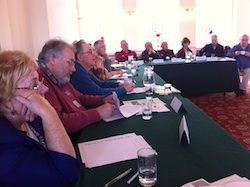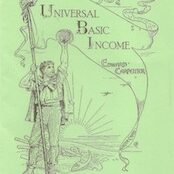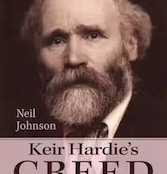“Fellowship was the foundation of their politics,” said Barry Winter, recalling the culture of the early ILP at the organisation’s 120th anniversary Weekend School in Scarborough on 4/5 May. And fellowship was much in evidence among modern ILPers and friends too as they gathered to consider lessons of the ILP’s past for prospects of progressive change in the future.
Winter’s remarks came during the opening session of a two-day programme, called ‘Ethical Socialism, Capitalism and the State’, in which he surveyed the ILP’s 12 decades of political activity in and out of the Labour Party, asking what can be learned by a left struggling to make headway in our current disconnected and politically disenchanted society.
 He began by sketching the lives of some of the remarkable people whose own personal stories make up the ILP’s history, from the well-known, such as Keir Hardie and Jennie Lee, to the less familiar though no less important, such as Walter and Annie Mallorie, Emrys Thomas and Stafford Cottman.
He began by sketching the lives of some of the remarkable people whose own personal stories make up the ILP’s history, from the well-known, such as Keir Hardie and Jennie Lee, to the less familiar though no less important, such as Walter and Annie Mallorie, Emrys Thomas and Stafford Cottman.
He considered the ILP’s beginnings and its role in founding the Labour Party, the disappointments which led to its disaffiliation in 1932, and the political perspective it brought to the left on returning to Labour in the 1970s.
“Put simply, the early ILP, with its strong ethical concerns, wanted to ‘make socialists’,” said Winter. “It was about creating an alternative political culture as the foundation for building a new, socially-just society.”
This, he pointed out, was always “an arduous, uphill struggle”, one that is no less difficult today.
“Never before have people been quite so disillusioned with politics at a time when only politics can resolve the serious economic problems faced by much of the western world,” he commented.
“Considering the ravages capitalism is continuing to wreak, today’s challenge is as big as anything the ILP has faced in its history. The question is whether the left, of which we are a tiny fragment, can make itself fit for purpose.
“The ILP’s history does not offer us the answers but I think it can afford us some helpful insights about the direction of travel. And perhaps that’s all we could ever expect.”
Co-operative rennaissance
One potential ‘direction of travel’ for the left was the focus of discussion in the following session, led by Anna Turley, a Labour prospective parliamentary candidate for Redcar and senior researcher at IPPR North.
Turley described what she called a “co-operative rennaissance” in the public sector, centred on the growth of co-operative councils and schools as alternatives to the private sector.
A former coordinator of the Co-operative Councils Network, Turley argued that Labour local authorities have been rediscovering some of the early movement’s values of self-help to resist the coalition government’s austerity-led cut-backs and privatisation agenda.
More than 100 Labour councils originally signed up to a set of principles based on co-op values, and 21 are now formally linked as part of the Network. It was established in 2011, not only as a defence against the coalition’s attempt to co-opt the language and purpose of mutuals, but also “in recognition that public services need to change”, she said.
Turley outlined examples of current co-operative council-led initiatives in areas such as housing, regeneration, education, finance, energy and youth crime. “The Network believes a co-operative approach can be applied to any area of local government,” she said. “But councils have an important role to play in shaping localities as a whole, not just as service deliverers.”
While the speech was warmly received, a number of respondents warned that implementing co-operative initiatives in a period of public sector cuts was fraught with danger, that the difficulties of maintaining co-operative alternatives in an increasingly open market should not be underestimated.
One nation?
Robust discussion continued on day two with consideration of Ed Miliband’s ‘one nation’ Labour Party and its policy review process led by MP Jon Cruddas, whose speech to the IPPR in February was shown on screen to kick off the debate.
Views of Cruddas’s talk ranged from the highly critical (it was “patronising nonsense” and “fashionable froth”, with “too much emphasis on nation and family”, according to some), to the more accepting – “humanitarian”, “sensitive”, and “a genuine attempt to think through some difficult problems”, according to others.
Some argued that ‘one nation Labour’ appeared to be no different to ‘new Labour’, that it was still undemocratic and over-centralised; while others suggested it was open to ideas which previous Labour leaderships had never considered, and that its more thoughtful and historical approach “provides an opening to talk about our politics”.
ILP chair David Connolly eventually captured the mood, emphasising the dangers of a knee-jerk hostility, which merely offers “a road to nowhere”.
“The situation we face in this country is drastic,” he said. “The last veneer of social democracy is being ripped away to reveal a very selfish society. The right-wing drift we always talked about is becoming a sprint.
“The question is, is this leadership one that can halt that? We don’t know if it is, but we have to engage with them and what they’re trying to do.”
Many agreed that engagement was key, and that the ILP has much to do itself via day schools, public meetings and more round table discussions. One hundred and twenty years on, the ethic of fellowship remains; the task still to create an alternative political culture for a new society.
—-
Click here to read Barry Winter’s ‘Reflections on the ILP’s History’.
Click here to read more on the ILP’s history.
Click here to read our series of ILP anniversary profiles.
Buy ILP 120th anniversary calendars here.
Click here to find out more about Anna Turley, and here to read about her work with IPPR.
Click here for more on the Co-operative Councils Network.
See also: ‘Handle with Care’ and ‘Are Co-operative Schools the Answer?’
Click here for Jon Cruddas’s speech on ‘The Condition of Britain’.
Click here for more on Labour’s policy review process and ‘one nation’ Labour.
Click here to download the ‘one nation’ Labour e-book, edited by Cruddas.



12 August 2013
[…] his speech on ‘The Condition of Britain’, debated at the ILP weekend school in May, Jon Cruddas MP listed a range of social issues that will underpin his policy review and the […]
15 July 2013
[…] This is the latest contribution to a debate on One Nation Labour started at the ILP’s 2013 Weekend School. A report of the Weekend School can be read here. […]
27 June 2013
[…] how big that gulf in trust has become was apparent at this year’s Weekend School less than two months ago when ILPers and friends had their first opportunity to “engage with” […]
21 June 2013
[…] At the 2013 ILP weekend school on 4/5 May, the discussion centred on the Labour Party’s political strategy outlined by Jon Cuddas MP, coordinator of the party’s policy review process. The discussion ranged over what a Labour government might, could and should do if the party is successful at the 2015 general election. […]
12 June 2013
[…] A report of the ILP’s 2013 Weekend School, and links to speeches at the round table event, can be found here. […]
23 May 2013
At the ‘One Nation’ debate held at the ILP weekend at Scarborough, I was one of those who was in the camp that was highly critical of Jon Cruddas. I felt that all that has happened under Ed Miliband’s leadership is that, since the days of ‘New Labour’, we have merely moved from one pro-capitalist camp into another.
New Labour stressed the needs of what it hoped would be a dynamic and growing (finance-based) economy. From the wealth this was supposed to engender, it was hoped to take resourses which could be used for socially useful purposes. For a period this seemed to be partly working, but the process only aided the final massive financial crash.
Ed has moved us into a ‘One Nation’ approach, which looks towards a form of ‘responsible capitalism’ based more closely then some realise on the views of Benjamin Disreali in ‘Sybil or The Two Nations’. To get capitalism to act in any way that could be described as ‘responsible’ would require a whole host of controls over business and financial institutions. I am not sure how fully this is realised.
Socialists could press Cruddas and company for such measures; whilst needing to be continously aware that capitalists will always work for means to get around any restraints that are placed upon them. So one tactic after another would need to be developed to restrain capital – and that would be needed just to hold the initial ground. But to press for such measures might be better than nothing and would provide the opportunity to press for something more – such as extra scope for the co-operative movement, avenues of workers’ comtrol, encouragement for the voluntary sector, and a reclaiming of the public services.
The ILP has a general perspective which was endorsed at Scarborough in 2011. I am happy with the general thrust of this document. But the ILP as a small organisation has the problem of how it advances its case. Being purist is of limited comfort, if it is at the price of being totally ineffective – no matter how comforting it is to fall into a socialist slumber amongst like-minded comrades.
If the ILP is to have any form of impact it has to take account of the nature of the current Labour movement. The Labour Party is run entirely from the centre and its limited number of activists mainly see themselves as being vote gatherers, whilst containing elements of would-be careerists. Furthermore, the ideology of ‘One Nation Labour’ is, at best, a form of pre-Thatcherite Conservatism. Then the trade union movement tends not only to lack any socialist consciousness, but it barely has a form of trade union consciousness. Unfortunately, we can’t suddenly bounce the Labour movement into democratic practices and socialist understandings.
Writing in 1892 (before the formation of either the ILP or the Labour Representation Committee), George Bernard Shaw wrote that the Fabians “permeated the [pre-Labour] party organisations and pulled all the wires we could lay our hands on with our utmost adroitness and energy; and we succeeded so far that by 1888 we gained the solid advantage of a Progressive majority, full of ideas that would never have come into their heads had not Fabians put them there, on the first London County Council.”
We are in a different world to that of 1892, but perhaps we need to try and permeate our views amongst those close to the movers and shakers who have indicated (however slighly) that they have views which can be built upon. This means that we need to examine what people such as Cruddas, Maurice Glasman and even Jon Trickett have been saying – not to form a supporters’ club, nor to kneecap them, but instead to try and develop a dialogue which will allow us to permeate them with ideas which would not otherwise come into their heads. It means that we need to be on the look out for who is saying what. To see what half-thought out ideas can be built upon and thus transformed.
A more comfortable tactic may be appropriate in the future; but the best we might be able to do for now is to seek to win friends and influence people. We will also need to ensure that we are not being soaked in.
9 May 2013
[…] This is an edited version of a talk given to the ILP’s Weekend School in Scarborough on 6 May 2013. Read more about the weekend school here. […]